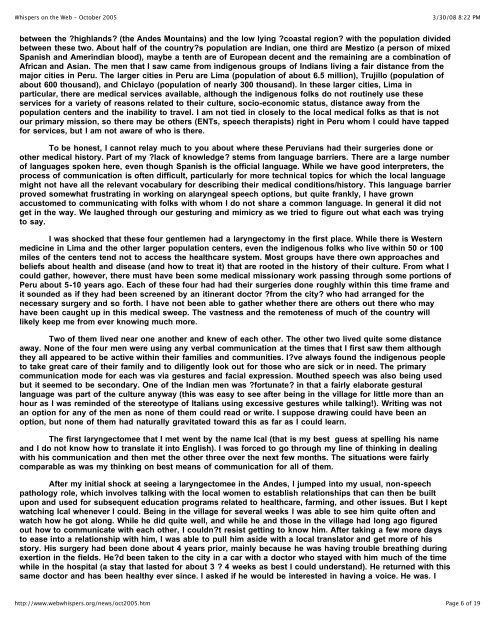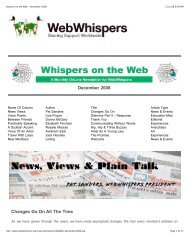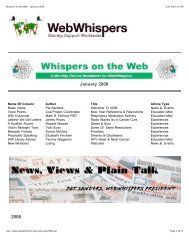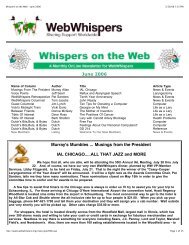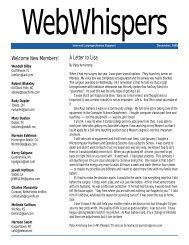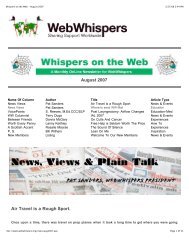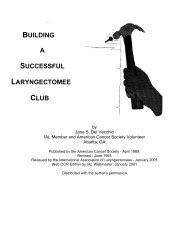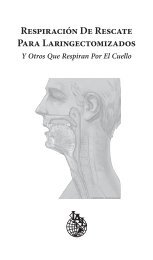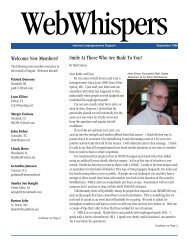Whispers on the Web - October 2005 - WebWhispers Nu-Voice Club
Whispers on the Web - October 2005 - WebWhispers Nu-Voice Club
Whispers on the Web - October 2005 - WebWhispers Nu-Voice Club
You also want an ePaper? Increase the reach of your titles
YUMPU automatically turns print PDFs into web optimized ePapers that Google loves.
<str<strong>on</strong>g>Whispers</str<strong>on</strong>g> <strong>on</strong> <strong>the</strong> <strong>Web</strong> - <strong>October</strong> <strong>2005</strong><br />
3/30/08 8:22 PM<br />
between <strong>the</strong> ?highlands? (<strong>the</strong> Andes Mountains) and <strong>the</strong> low lying ?coastal regi<strong>on</strong>? with <strong>the</strong> populati<strong>on</strong> divided<br />
between <strong>the</strong>se two. About half of <strong>the</strong> country?s populati<strong>on</strong> are Indian, <strong>on</strong>e third are Mestizo (a pers<strong>on</strong> of mixed<br />
Spanish and Amerindian blood), maybe a tenth are of European decent and <strong>the</strong> remaining are a combinati<strong>on</strong> of<br />
African and Asian. The men that I saw came from indigenous groups of Indians living a fair distance from <strong>the</strong><br />
major cities in Peru. The larger cities in Peru are Lima (populati<strong>on</strong> of about 6.5 milli<strong>on</strong>), Trujillo (populati<strong>on</strong> of<br />
about 600 thousand), and Chiclayo (populati<strong>on</strong> of nearly 300 thousand). In <strong>the</strong>se larger cities, Lima in<br />
particular, <strong>the</strong>re are medical services available, although <strong>the</strong> indigenous folks do not routinely use <strong>the</strong>se<br />
services for a variety of reas<strong>on</strong>s related to <strong>the</strong>ir culture, socio-ec<strong>on</strong>omic status, distance away from <strong>the</strong><br />
populati<strong>on</strong> centers and <strong>the</strong> inability to travel. I am not tied in closely to <strong>the</strong> local medical folks as that is not<br />
our primary missi<strong>on</strong>, so <strong>the</strong>re may be o<strong>the</strong>rs (ENTs, speech <strong>the</strong>rapists) right in Peru whom I could have tapped<br />
for services, but I am not aware of who is <strong>the</strong>re.<br />
To be h<strong>on</strong>est, I cannot relay much to you about where <strong>the</strong>se Peruvians had <strong>the</strong>ir surgeries d<strong>on</strong>e or<br />
o<strong>the</strong>r medical history. Part of my ?lack of knowledge? stems from language barriers. There are a large number<br />
of languages spoken here, even though Spanish is <strong>the</strong> official language. While we have good interpreters, <strong>the</strong><br />
process of communicati<strong>on</strong> is often difficult, particularly for more technical topics for which <strong>the</strong> local language<br />
might not have all <strong>the</strong> relevant vocabulary for describing <strong>the</strong>ir medical c<strong>on</strong>diti<strong>on</strong>s/history. This language barrier<br />
proved somewhat frustrating in working <strong>on</strong> alaryngeal speech opti<strong>on</strong>s, but quite frankly, I have grown<br />
accustomed to communicating with folks with whom I do not share a comm<strong>on</strong> language. In general it did not<br />
get in <strong>the</strong> way. We laughed through our gesturing and mimicry as we tried to figure out what each was trying<br />
to say.<br />
I was shocked that <strong>the</strong>se four gentlemen had a laryngectomy in <strong>the</strong> first place. While <strong>the</strong>re is Western<br />
medicine in Lima and <strong>the</strong> o<strong>the</strong>r larger populati<strong>on</strong> centers, even <strong>the</strong> indigenous folks who live within 50 or 100<br />
miles of <strong>the</strong> centers tend not to access <strong>the</strong> healthcare system. Most groups have <strong>the</strong>re own approaches and<br />
beliefs about health and disease (and how to treat it) that are rooted in <strong>the</strong> history of <strong>the</strong>ir culture. From what I<br />
could ga<strong>the</strong>r, however, <strong>the</strong>re must have been some medical missi<strong>on</strong>ary work passing through some porti<strong>on</strong>s of<br />
Peru about 5-10 years ago. Each of <strong>the</strong>se four had had <strong>the</strong>ir surgeries d<strong>on</strong>e roughly within this time frame and<br />
it sounded as if <strong>the</strong>y had been screened by an itinerant doctor ?from <strong>the</strong> city? who had arranged for <strong>the</strong><br />
necessary surgery and so forth. I have not been able to ga<strong>the</strong>r whe<strong>the</strong>r <strong>the</strong>re are o<strong>the</strong>rs out <strong>the</strong>re who may<br />
have been caught up in this medical sweep. The vastness and <strong>the</strong> remoteness of much of <strong>the</strong> country will<br />
likely keep me from ever knowing much more.<br />
Two of <strong>the</strong>m lived near <strong>on</strong>e ano<strong>the</strong>r and knew of each o<strong>the</strong>r. The o<strong>the</strong>r two lived quite some distance<br />
away. N<strong>on</strong>e of <strong>the</strong> four men were using any verbal communicati<strong>on</strong> at <strong>the</strong> times that I first saw <strong>the</strong>m although<br />
<strong>the</strong>y all appeared to be active within <strong>the</strong>ir families and communities. I?ve always found <strong>the</strong> indigenous people<br />
to take great care of <strong>the</strong>ir family and to diligently look out for those who are sick or in need. The primary<br />
communicati<strong>on</strong> mode for each was via gestures and facial expressi<strong>on</strong>. Mou<strong>the</strong>d speech was also being used<br />
but it seemed to be sec<strong>on</strong>dary. One of <strong>the</strong> Indian men was ?fortunate? in that a fairly elaborate gestural<br />
language was part of <strong>the</strong> culture anyway (this was easy to see after being in <strong>the</strong> village for little more than an<br />
hour as I was reminded of <strong>the</strong> stereotype of Italians using excessive gestures while talking!). Writing was not<br />
an opti<strong>on</strong> for any of <strong>the</strong> men as n<strong>on</strong>e of <strong>the</strong>m could read or write. I suppose drawing could have been an<br />
opti<strong>on</strong>, but n<strong>on</strong>e of <strong>the</strong>m had naturally gravitated toward this as far as I could learn.<br />
The first laryngectomee that I met went by <strong>the</strong> name Ical (that is my best guess at spelling his name<br />
and I do not know how to translate it into English). I was forced to go through my line of thinking in dealing<br />
with his communicati<strong>on</strong> and <strong>the</strong>n met <strong>the</strong> o<strong>the</strong>r three over <strong>the</strong> next few m<strong>on</strong>ths. The situati<strong>on</strong>s were fairly<br />
comparable as was my thinking <strong>on</strong> best means of communicati<strong>on</strong> for all of <strong>the</strong>m.<br />
After my initial shock at seeing a laryngectomee in <strong>the</strong> Andes, I jumped into my usual, n<strong>on</strong>-speech<br />
pathology role, which involves talking with <strong>the</strong> local women to establish relati<strong>on</strong>ships that can <strong>the</strong>n be built<br />
up<strong>on</strong> and used for subsequent educati<strong>on</strong> programs related to healthcare, farming, and o<strong>the</strong>r issues. But I kept<br />
watching Ical whenever I could. Being in <strong>the</strong> village for several weeks I was able to see him quite often and<br />
watch how he got al<strong>on</strong>g. While he did quite well, and while he and those in <strong>the</strong> village had l<strong>on</strong>g ago figured<br />
out how to communicate with each o<strong>the</strong>r, I couldn?t resist getting to know him. After taking a few more days<br />
to ease into a relati<strong>on</strong>ship with him, I was able to pull him aside with a local translator and get more of his<br />
story. His surgery had been d<strong>on</strong>e about 4 years prior, mainly because he was having trouble breathing during<br />
exerti<strong>on</strong> in <strong>the</strong> fields. He?d been taken to <strong>the</strong> city in a car with a doctor who stayed with him much of <strong>the</strong> time<br />
while in <strong>the</strong> hospital (a stay that lasted for about 3 ? 4 weeks as best I could understand). He returned with this<br />
same doctor and has been healthy ever since. I asked if he would be interested in having a voice. He was. I<br />
http://www.webwhispers.org/news/oct<strong>2005</strong>.htm<br />
Page 6 of 19


